Dear Florida Climate Center Friends,
We'd like to present you with the March 2015 edition of our newsletter. In this newsletter, you'll find our monthly climate summary, a list of special events that our staff attended, some pictures, and more. If you have any questions, please email us at climate@coaps.fsu.edu.
Thanks,
The Staff of the Florida Climate Center
 |  |  | David Zierden
State Climatologist | James O'Brien
Professor Emeritus | Melissa Griffin
Asst. State Climatologist |
|
|
Daylight Saving 2015
Just a friendly reminder to everyone that Daylight Saving Time begins at 2:00 AM on Sunday, March 8th. Before you go to bed the night of the 7th, make sure to turn your clock ahead by one hour to reflect the change.
|
February Climate Summary for Florida
The Florida Climate Center's February 2015 Florida Climate Summary is now available. The summary provides an analysis of temperature and precipitation trends across the state, along with data on hazardous weather, drought, the impacts of the weather and any records tied or broken for the month. During February, average temperatures were below normal and rainfall totals were varied across most of Florida. ENSO-neutral conditions are continuing in the equatorial Pacific. The Climate Prediction Center (CPC) predicts normal temperatures and above normal precipitation for the state through May 2015. Past summaries are archived here.
| February average temperatures and departures from normal (°F) for select cities. | 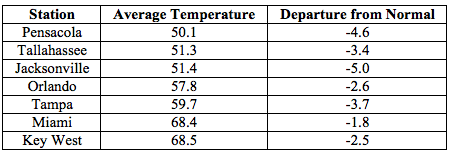 |
| February precipitation totals and departures from normal (inches) for select cities. | 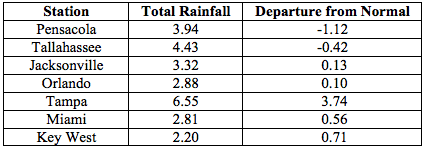 |
| A graphical depiction of the monthly rainfall departure from normal (inches) for February (courtesy of NOAA, NWS). | 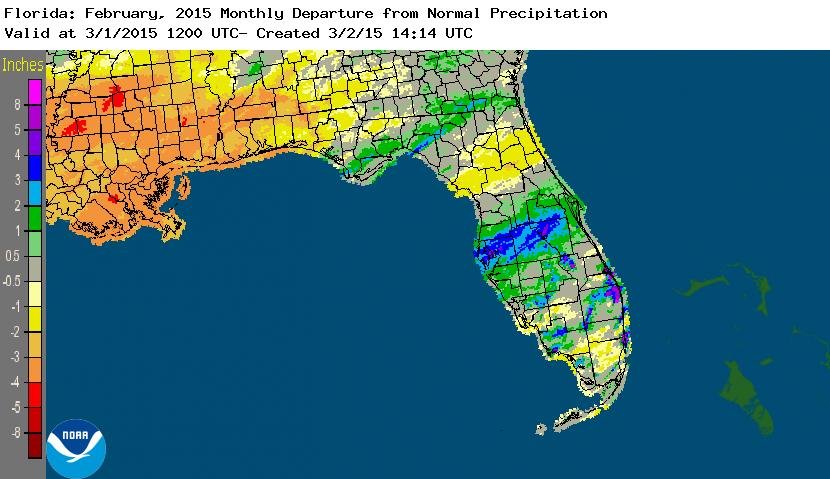 |
|
|
State Climatologist Talks Weather and Climate at Wiregrass Cotton Expo
 The annual Wiregrass Cotton Expo in Dothan, Alabama was held on February 6th. The event is hosted by the Wiregrass Research Station and Auburn University Extension. State Climatologist David Zierden has been a regular part of the program for over ten years now and area farmers look forward to his climate and weather summary for the past year and particularly the outlook for the coming planting and growing season. This is the time of year when decisions are made about varieties, acres planted, and planting date and growers use the climate forecast to help make these decisions. David Zierden reviewed the cool and wet conditions that plagued the early season last year and the ensuing dryness during the summer months. This year we are under the influence of a weak El Nino and that should mean cooler temperatures and more rainfall than normal as the Southeast heads into spring. The annual Wiregrass Cotton Expo in Dothan, Alabama was held on February 6th. The event is hosted by the Wiregrass Research Station and Auburn University Extension. State Climatologist David Zierden has been a regular part of the program for over ten years now and area farmers look forward to his climate and weather summary for the past year and particularly the outlook for the coming planting and growing season. This is the time of year when decisions are made about varieties, acres planted, and planting date and growers use the climate forecast to help make these decisions. David Zierden reviewed the cool and wet conditions that plagued the early season last year and the ensuing dryness during the summer months. This year we are under the influence of a weak El Nino and that should mean cooler temperatures and more rainfall than normal as the Southeast heads into spring.
|
|
Assistant State Climatologist Attends FISE Workshop
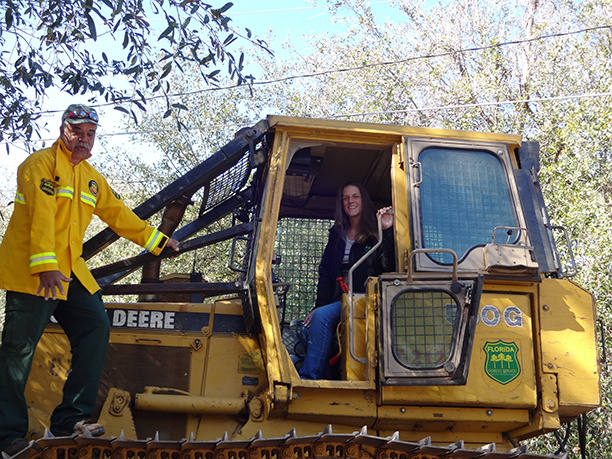 Sponsored by the Florida Forest Service, the Florida Department of Agriculture, Georgia Forestry Commission and Normandeau Environmental Consultants, the Fire in the Southern Ecosystem (FISE) Workshop is a curriculum and training program that gives educators information and tools to teach about fire in the Southeastern U.S. The program began in 1999 and has reached more than 3,200 educators. Workshops are free to educators of all types - teachers, nature center or park staff, homeschool parents, Scout and 4-H leaders, camp counselors, and others. Assistant State Climatologist, Melissa Griffin, along with COAPS Outreach Coordinator, Brittany Pace, attended the day-long professional development event at the Tallahassee Natural History Museum and participated in conducting a prescribed burn. Sponsored by the Florida Forest Service, the Florida Department of Agriculture, Georgia Forestry Commission and Normandeau Environmental Consultants, the Fire in the Southern Ecosystem (FISE) Workshop is a curriculum and training program that gives educators information and tools to teach about fire in the Southeastern U.S. The program began in 1999 and has reached more than 3,200 educators. Workshops are free to educators of all types - teachers, nature center or park staff, homeschool parents, Scout and 4-H leaders, camp counselors, and others. Assistant State Climatologist, Melissa Griffin, along with COAPS Outreach Coordinator, Brittany Pace, attended the day-long professional development event at the Tallahassee Natural History Museum and participated in conducting a prescribed burn.
|
|
Florida Climate Center and COAPS Help Farmers Tackle Climate Change
 The Florida Climate Center and COAPS hosted the 11th meeting of the Tri-State Climate Working Group for Row Crop Famers on February 9th. The meeting's theme was "WHAT IF" scenarios for row crops in the SE USA. The goals for the day-long meeting were to examine future scenarios for row crop production in the SE US based on past trends; discuss potential changes in climate, competing land uses, and water availability; identify possible strategies that different stakeholder groups might use to anticipate and prepare for changes (producers, industries, cooperatives, universities, USDA, etc.); and determine interest in exploring these issues more deeply together. There were 54 people in attendance, including farmers and ranchers, Extension professionals, and scientists. Participants saw a range of presentations on climate futures, crop responses to climate, land use change and economics in the Southeast, new crops in the Southeast, and water quantity and quality issues. Participants also answered questions using clickers, and showed that they are optimistic, with the majority agreeing that the row crop industry is willing to adapt to climate change. One climatologist from FSU said, "...climate change is coming, but it is coming slowly. Technology is also changing and you have new opportunities. Climate change is part of those decisions." On the other hand a crop modeler from UF notes that, "Yes, climate change might be slow, but slow changes can have fast and cascading impacts with implications for other systems...so we need to be prepared." |
|
Community Outreach Activities
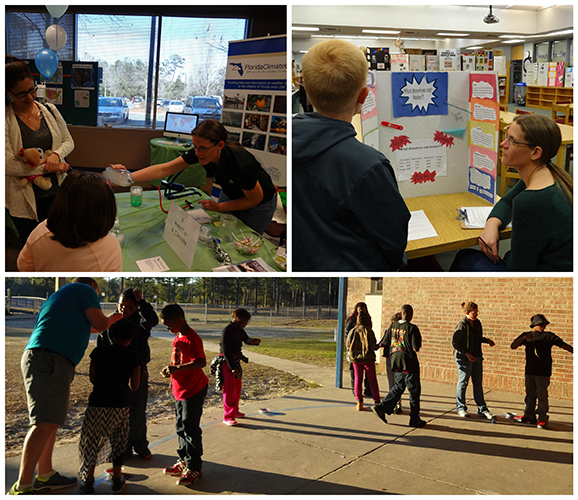 February was a busy month in terms of outreach for the Florida Climate Center. Assistant State Climatologist Melissa Griffin judged projects at various elementary schools across the Tallahassee area, and was a judge for the Environmental Science Division at the Capital Regional Science and Engineering Fair on February 13th. Ms. Griffin also spent time with the local Boys and Girls Club, introducing 5th graders to the water cycle through an interactive game. February was a busy month in terms of outreach for the Florida Climate Center. Assistant State Climatologist Melissa Griffin judged projects at various elementary schools across the Tallahassee area, and was a judge for the Environmental Science Division at the Capital Regional Science and Engineering Fair on February 13th. Ms. Griffin also spent time with the local Boys and Girls Club, introducing 5th graders to the water cycle through an interactive game.
On February 21st, The Florida Climate Center took part in an Open House event. Along side the Center for Ocean-Atmospheric Prediction Studies and the Center for Advanced Power Systems, members of the climate center demonstrated the power of wind, created clouds, explored the water cycle, quizzed participants about Florida weather, and discussed weather safety. Over 1,000 people attended the event, making it one of the most successful Open Houses for all the groups involved.
|
|
Florida Extension and Sea Grant learn about Climate Change
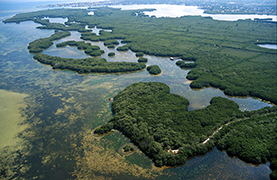 The Climate Change Work Action Group comprised of University of Florida Extension and Sea Grant professionals conducted a two-day in service training program for county agents on February 23rd and 24th. The training was held at picturesque Weedon Island Preserve near St. Petersburg Florida. State Climatologist opened the program with an overview of Climate Change Science and sea level rise. There were also presentations by University of South Florida on the measurement and prediction of sea level rise and how the growing flooding threat could change insurance practices in the state. The second day focused on the demonstration of a variety of tools and resources available to help communities plan for and adapt to rising water levels and changing climate conditions. The Climate Change Work Action Group comprised of University of Florida Extension and Sea Grant professionals conducted a two-day in service training program for county agents on February 23rd and 24th. The training was held at picturesque Weedon Island Preserve near St. Petersburg Florida. State Climatologist opened the program with an overview of Climate Change Science and sea level rise. There were also presentations by University of South Florida on the measurement and prediction of sea level rise and how the growing flooding threat could change insurance practices in the state. The second day focused on the demonstration of a variety of tools and resources available to help communities plan for and adapt to rising water levels and changing climate conditions.
|
|
Upcoming Events
March 17, 2015:
FSU Day at the Capitol Tallahassee, FL
April 9-10, 2015:
Dept. of Health Technical Advisory Meeting in Tallahassee, FL
April 22-24, 2015:
Southeast Regional Climate Center TAC Meeting in Folly Beach, SC
April 25, 2015:
Earth Day 2015 at Cascades Park in Tallahassee, FL
May 11-12, 2015:
NIFA/USDA Organizational Project Meeting in Quincy, FL
May 15, 2015:
Tri-State 4-H Training Workshop in Macon, GA
|
|
About Us
The Florida Climate Center is part of a three-tiered system of national, regional, and state climate offices, including NOAA's National Climatic Data Center and the Southeast Regional Climate Center. The Florida State Climatologist and other staff at the Florida Climate Center provide the following information and services to the people of Florida:
· Climate Data:
Historical weather observations for weather stations throughout the state of Florida. We are able to provide data for most stations from 1948-present.
· Climate Information:
Long-term historical averages for various stations, climate divisions, and the entire state.
· Extreme Event Records:
Information and analyses on extreme events such as freezes, droughts, floods and hurricanes.
· Special Analysis:
With their vast knowledge of El Niņo, La Niņa and climate variability, the State Climatologist and staff can offer expert insight into Florida's climate trends.
· Outreach:
Activities, presentations, and workshops that inform and educate the people of Florida about current and emerging climate issues. We also coordinate volunteers for the Community Collaborative Rain, Hail & Snow Network (CoCoRaHS).
More About Us
|
|